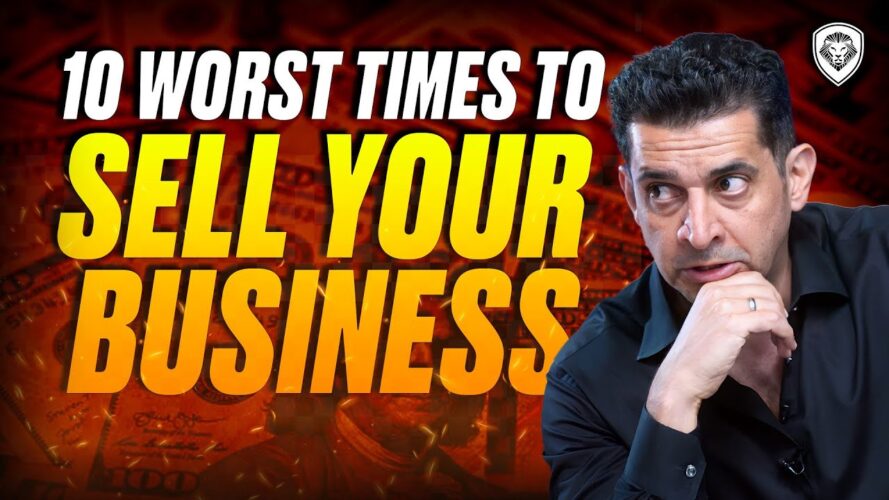Selling your business at the wrong time could rob your future fortune of a five-times multiplier. In this video, Patrick Bet-David explains the 10 worst times to sell, and explains how you should prepare your business for the market.
Patrick explains how he faced this fate himself and narrowly avoided it. At one point, he was so stressed running his business that he considered selling it for $10 million.
He waited five more years, and was offered $50 million. Again, he turned it down.
Then he received an offer for $120 million. He turned that down.
He waited three more years. And, finally, the number was beautiful …
Learn the benefits of becoming a Valuetainment Member and subscribe today!
Patrick begins with a story from one of the clients of his consulting firm. The client inherited his father’s transportation company which was doing $60 million a year in 2022. Today, it’s only doing $20 million. A truck was once worth $150,000 and now they’re worth $50,000. Orders are down. Prices of transportation are up. This leads to the first rule:
1. Never Sell Your Business in a Down Year
When business is not doing well, people do one of three things: fight, flight, or freeze.
Those who freeze are like a deer in headlights, too afraid to even make the phone calls to clients in case they cancel.
Flight—walking away from your business—might feel like the easy thing to do, but it is not easy living a life of “could have, would have, should have.” You could be walking away from untold future profits.
Staying and fighting is the right thing to do.
2. You Haven’t Done Enough Research
You have not done enough research to see how you can increase the market value of your business. Why should you take someone else’s word for it? Other people are not as invested in YOU making high returns on your business.
Even if you think you’ve done market research, you may not have done market research on companies in neighboring industries. For instance, if your company is only evaluated at X, but tech companies are being valued at 10-15 times that number, then if you can find a way to buy the rights to a technology and incorporate it into your business, you will have 10-15x’d your company’s market value.
3. Interest Rates Matter
If you sell your company when interest rates are high, you are not going to get the highest price.
When rates are low, money is cheap. Bigger companies, in those times, have more money on hand to buy up businesses.
If you sell at a low interest rate, you will get a better valuation than at a high interest rate. For example, 2023 was not a good year for IPOs.
But if you wait a few years, you could see companies and investors lining up to give you a price you previously had to fight tooth and nail for.
4. You Haven’t Hired a Consulting Firm
You have to hire a consulting firm to look at your management teams, your org chart, your numbers, and help you put a pitch deck together.
Spending a few hundred thousand on consulting fees to clean up your business before you hit the market could put you many times over your initial asking price.
If you are someone that is looking to connect with a consulting firm before you sell your business, check out the five-by-five approach of Bet-David Consulting (BDC), fill out your information, watch the 20-minute video, and one of their reps will reach out to you.
If BDC is not the right fit for you, that’s fine. But getting in touch with a consulting firm or an advisor is crucial before you take the sale of your business to the next stage.
5. Disorganized Financial Records
Usually people hire a relative or a friend to do their accounting when they start off. That’s fine when you’re small, but when it comes down to raising and auditing serious money, you cannot afford not to upgrade.
It may be hard to let someone go that is dear to you, but if you explain to them the reality of the broader picture, they will understand.
It is particularly important to do this prior to selling, for the same reason that is important to hire a consultant: you have to get your house in order before you put it on the market!
Watch the rest of Patrick’s video to see the next five steps.
 Shane Devine is a writer covering politics, economics, and culture for Valuetainment. Follow Shane on X (Twitter).
Shane Devine is a writer covering politics, economics, and culture for Valuetainment. Follow Shane on X (Twitter).


















Add comment